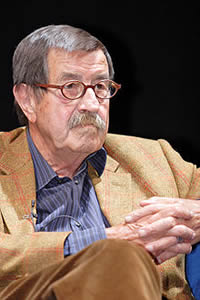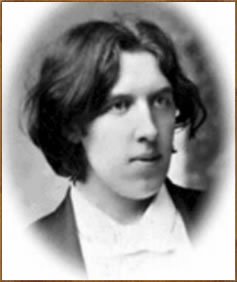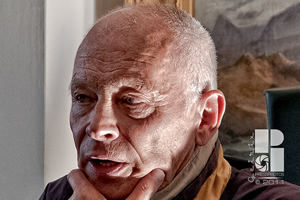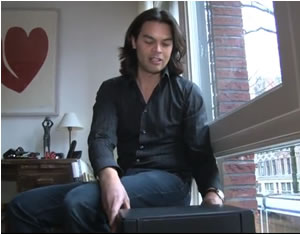85 Jaar Günther Grass
De Duitse dichter en schrijver Günter Grass werd geboren in Danzig (tegenwoordig Gdansk, Polen) op 16 oktober 1927. Günther Grass viert vandaag zijn 85e verjaardag. Zie ook mijn blog van 16 oktober 2010 en eveneens alle tags voor Günter Grass op dit blog.
Uit: Die Blechtrommel
“Zugegeben: ich bin Insasse einer Heil- und Pflegeanstalt, mein Pfleger beobachtet mich, läßt mich kaum aus dem Auge; denn in der Tür ist ein Guckloch, und meines Pflegers Auge ist von jenem Braun, welches mich, den Blauäugigen, nicht durchschauen kann.
Mein Pfleger kann also gar nicht mein Feind sein. Liebgewonnen habe ich ihn, erzähle dem Gucker hinter der Tür, sobald er mein Zimmer betritt, Begebenheiten aus meinem Leben damit er mich trotz des ihn hindernden Guckloches kennenlernt. Der Gute scheint meine Erzählungen zu schätzen, denn sobald ich ihm etwas vorgelegen habe, zeigt er mir, um sich erkenntlich zu geben, sein neuestes Knotengebilde. Ob er ein Künstler ist, bleibe dahingestellt. Eine Ausstellung seiner Kreationen würde jedoch von der Presse gut aufgenommen werden, auch einige Käufer herbeilocken. Er knotet ordinäre Bindfäden, die er nach den Besuchsstunden in den Zimmern seiner Patienten sammelt und entwirrt, zu vielschichtig verknorpelten Gespenstern, taucht diese dann in Gips, läßt sie erstarren und spießt sie mit Stricknadeln, die auf Holzsöckelchen befestigt sind.
Oft spielt er mit dem Gedanken, seine Werke farbig zu gestalten. Ich rate davon ab, weise auf mein weißlackiertes Metallbett hin und bitte ihn, sich dieses vollkommenste Bett bunt bemalt vorzustellen. Entsetzt schlägt er dann seine Pflegerhände über dem Kopf zusammen, versucht in etwas zu starrem Gesicht allen Schrecken gleichzeitig Ausdruck zu geben und nimmt Abstand von seinen farbigen Plänen.
Mein weißlackiertes metallenes Anstaltsbett ist also ein Maßstab. Mir ist es sogar mehr: mein Bett ist das endlich erreichte Ziel, mein Trost ist es und könnte mein Glaube werden, wenn mir die Anstaltsleitung erlaubte, einige Änderungen vorzunehmen: das Bettgitter möchte ich erhöhen lassen, damit mir niemand mehr zu nahe tritt…”

Günter Grass (Danzig, 16 oktober 1927)
De Iers-Engelse schrijver Oscar Wilde werd geboren op 16 oktober 1854 in Dublin. Zie ook alle tags voor Oscar Wilde op dit blog.
Ballad of Reading Gaol – I(Fragment)
Some love too little, some too long,
Some sell, and others buy;
Some do the deed with many tears,
And some without a sigh:
For each man kills the thing he loves,
Yet each man does not die.
He does not die a death of shame
On a day of dark disgrace,
Nor have a noose about his neck,
Nor a cloth upon his face,
Nor drop feet foremost through the floor
Into an empty space.
He does not sit with silent men
Who watch him night and day;
Who watch him when he tries to weep,
And when he tries to pray;
Who watch him lest himself should rob
The prison of its prey.
He does not wake at dawn to see
Dread figures throng his room,
The shivering Chaplain robed in white,
The Sheriff stern with gloom,
And the Governor all in shiny black,
With the yellow face of Doom.
He does not rise in piteous haste
To put on convict-clothes,
While some coarse-mouthed Doctor gloats, and notes
Each new and nerve-twitched pose,
Fingering a watch whose little ticks
Are like horrible hammer-blows.
He does not feel that sickening thirst
That sands one’s throat, before
The hangman with his gardener’s gloves
Comes through the padded door,
And binds one with three leathern thongs,
That the throat may thirst no more.
He does not bend his head to hear
The Burial Office read,
Nor, while the anguish of his soul
Tells him he is not dead,
Cross his own coffin, as he moves
Into the hideous shed.
He does not stare upon the air
Through a little roof of glass:
He does not pray with lips of clay
For his agony to pass;
Nor feel upon his shuddering cheek
The kiss of Caiaphas.

Oscar Wilde (16 oktober 1854 – 30 november 1900)
De IJslandse schrijver Guðbergur Bergsson werd geboren op 16 oktober 1932 in Grindavik. Zie ook alle tags voor Guðbergur Bergsson op dit blog.
Uit: Blue Eyes in a Pool of Sharks
“But in reality nature was damaged and many Russian cities became because of that ghost dwellings like American radio stations in this country left by the so called NATO defence force. They were not only in Keflavik but all over Iceland. And something similar might happen to places now willingly accepting Alcoa factories. Their directors and owners only aim at making benefits. That is their nature and aim they defend better than we protect ours. Having done what they can and having emptied their possibilities they simply move to another region that has quickly entered the competition offering still better conditions and facilities concerning taxes and prices of electricity. Capitalism in America is that way and it is too well known in all the United States.
To me this is felt as a question of knowledge. I have not suffered it in the flesh. In reality it is remote, something like a sad memory, a frustration, a sign of lack of believe in human dignity. It is like a feeling that a tourist might have, a tourist entering Human history. But to see in the future similar destruction in my fatherland where my hands can feel things and my feet walk brings anger, even in the vain of hateful sense of justice when it is absurd and based on frustration.”

Guðbergur Bergsson (Grindavik, 16 oktober 1932)
De Amerikaanse schrijver Eugene Gladstone O’Neill werd op 16 oktober 1888 in New York City geboren. Zie ook alle tags voor Eugene O’Neill op dit blog.
Uit: The Iceman Cometh
“LARRY–(grins) Yes, it’s my bad luck to be cursed with an iron constitution that even Harry’s booze can’t corrode.
ROCKY–De old anarchist wise guy dat knows all de answers! Dat’s you, huh?
LARRY–(frowns) Forget the anarchist part of it. I’m through with the Movement long since. I saw men didn’t want to be saved from themselves, for that would mean they’d have to give up greed, and they’ll never pay that price for liberty. So I said to the world, God bless all here, and may the best man win and die of gluttony! And I took a seat in the grandstand of philosophical detachment to fall asleep observing the cannibals do their death dance. (He chuckles at his own fancy–reaches over and shakes Hugo’s shoulder.) Ain’t I telling him the truth, Comrade Hugo?
ROCKY–Aw, fer Chris’ sake, don’t get dat bughouse bum started!
HUGO–(raises his head and peers at Rocky blearily through his thick spectacles–in a guttural declamatory tone) Capitalist swine! Bourgeois stool pigeons! Have the slaves no right to sleep even? (Then he grins at Rocky and his manner changes to a giggling, wheedling playfulness, as though he were talking to a child.) Hello, leedle Rocky! Leedle monkey-face! Vere is your leedle slave girls? (with an abrupt change to a bullying tone) Don’t be a fool! Loan me a dollar! Damned bourgeois Wop! The great Malatesta is my good friend! Buy me a trink! (He seems to run down, and is overcome by drowsiness. His head sinks to the table again and he is at once fast asleep.)
ROCKY–He’s out again. (more exasperated than angry) He’s lucky no one don’t take his cracks serious or he’d wake up every mornin’ in a hospital.
LARRY–(regarding Hugo with pity) No. No one takes him seriously. That’s his epitaph. Not even the comrades any more. If I’ve been through with the Movement long since, it’s been through with him, and, thanks to whiskey, he’s the only one doesn’t know it.
ROCKY–I’ve let him get by wid too much. He’s goin’ to pull dat slave-girl stuff on me once too often. (His manner changes to defensive argument.) Hell, yuh’d tink I wuz a pimp or somethin’. Everybody knows me knows I ain’t. A pimp don’t hold no job. I’m a bartender. Dem tarts, Margie and Poil, dey’re just a side line to pick up some extra dough. Strictly business, like dey was fighters and I was deir manager, see? I fix the cops for dem so’s dey can hustle widout gettin’ pinched. Hell, dey’d be on de Island most of de time if it wasn’t fer me. And I don’t beat dem up like a pimp would. I treat dem fine. Dey like me. We’re pals, see? What if I do take deir dough? Dey’d on’y trow it away. Tarts can’t hang on to dough. But I’m a bartender and I work hard for my livin’ in dis dump. You know dat, Larry”.

Eugene O’Neill (16 oktober 1888 – 27 november 1953)
Onafhankelijk van geboortedata:
De Nederlandse schrijver Gustaaf Peek werd geboren in Haarlem in 1975. Zie ook alle tags voor Gustaaf Peek op dit blog.
Uit: Dover (Vertaald door Davbid Colmer)
“In the second town he couldn’t find a parking space. He’d found the right street, but there were cars wedged in on both sides. Tony drove round and round waiting for someone to leave. He felt cold and clammy and realised it was a long time since he’d had anything to eat or drink. He ran out of patience and stopped right in front of the building. He jumped out, rushed up to the door, rang the bell. Nothing happened, so he banged on the door. Back to the van. Key in the lock, doors open – a car stopped behind him – he slammed them shut. The driver, a man, made a show of looking at his watch. The door of the house opened. A woman, drying her hands on what looked like a tea towel. Tony waited for some kind of signal. The woman said something he didn’t understand, but just stood there, the tea towel in her hands. Tony opened the doors and saw startled faces.
– Everything OK. Who’s next? Go, go!
Another three stood up, holding their bin bags, and got out. The car behind started hooting. Tony kept his back to it. The woman said something, the men answered. Doors shut. The clutch slipped, the van lurched, but didn’t stall. Two left. Rotterdam. Home.
He’d been driving non-stop for almost five hours. The old man and the fat guy would probably have done it faster. He was starting to feel faint. Five hours without food or drink. No breaks. Bladder about to burst. His city was close now. He had to get to the centre. Thuds from the back. He looked over his shoulder and saw fingers pressed against the window. A flushed face made Tony jump. Suddenly the man threw up against the glass. Tony’s hands stumbled over the wheel and the van swerved. Tony looked back at the road and regained control. A quick glance over his shoulder. The retching man’s face against the vomit-smeared window, the other man stretched out on the floor. He had to stop. Three hundred metres further on: clattering flags, garish signs advertising petrol and fast food. Tony took the exit.”

Gustaaf Peek (Haarlem, 1975)
Zie voor nog meer schrijvers van de 16e oktober ook mijn twee blogs van 16 oktober 2011.
